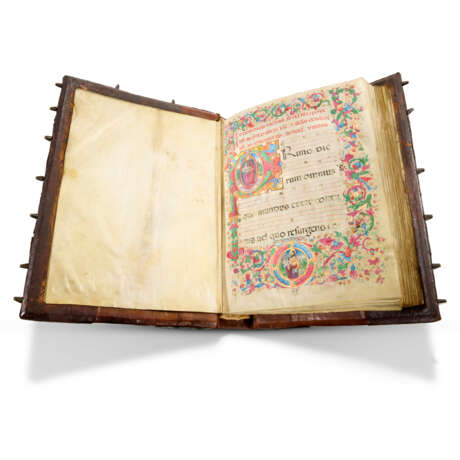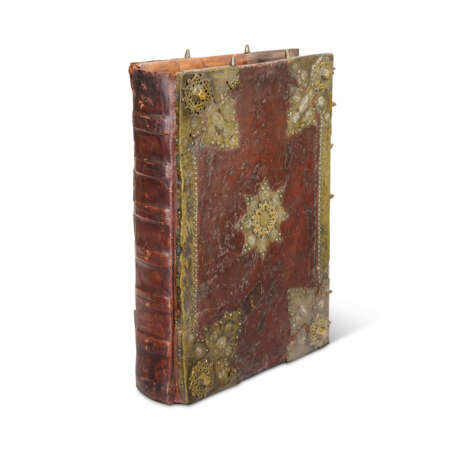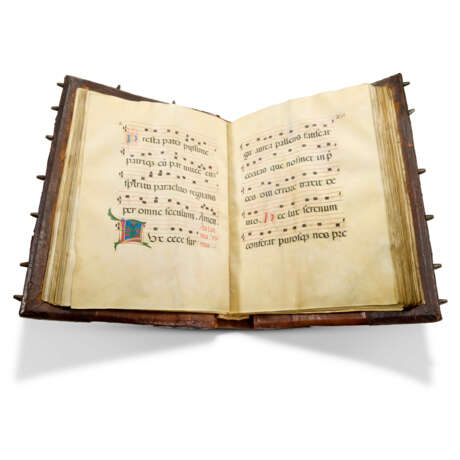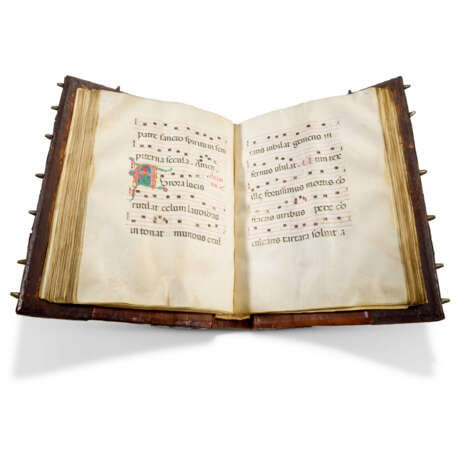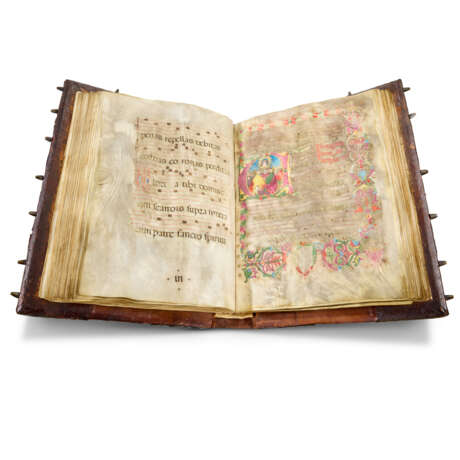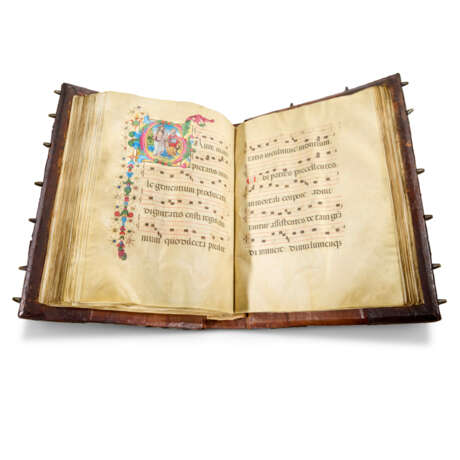ID 1249840
Lot 33 | A Cesena Hymnary
Estimate value
£ 70 000 – 100 000
Hymnary for the use of Cesena, in Latin, illuminated manuscript on vellum [Italy, Cesena, 1470s]
A sumptuously illuminated hymnary made for Cesena Cathedral, in an elaborate contemporary binding.
c.530 × 390mm. i + 233 + i leaves, written with five lines of text in gothic script and music in square notation on four-line red staves, collation: 1–78, 87 (of 8, -i before f.57), 9–128, 1310, 14–178, 187 (of 8, -vi after f.142), 198, 205 (of 6, -i before f.153), 218, 227 (of 8, -v after f.169), 238, 244, 257 (of 8, -i, before f.185), 268, 272, 28–318, one(?) more gathering missing, catchwords in most gatherings, illuminated with four large historiated initials, nearly 90 illuminated foliate initials, and hundreds of small flourished initials (the Pentecost opening very dirty and rubbed, typical minor effects of handling throughout, generally clean and in fine condition with wide margins).
Binding:
A remarkably elaborate contemporary binding. Bound in heavy wood boards covered with polished brown leather, with metal corner pieces, centrepieces, edge-strips, and spikes at the upper and fore-edges; the corners of the front board each with a projecting six-sided boss with a perforated flower-shaped base, set on top of a flat ornamental piece stamped with an oval ‘maria’ tool, circular tools enclosing a Madonna and Child, an ‘IHS’ monogram surrounded by a sunburst (symbol of San Bernardino), and a flower, and small rectangular tools with a Paschal Lamb and ‘ave’; the centrepiece in a flower-shape with alternating ‘IHS’ and Madonna and Child stamps; the corners of the lower board with the same projecting bosses set on a flatter panels, without blind-stamped tools and instead with raised circles and vesicas; the leather rough and cracked in places and with minor restorations (see De Marinis, 1960).
Provenance:
(1) Written for use at Cesena Cathedral: the only saint whose feast is illuminated with a large historiated initial is that of St Severus, archbishop of Ravenna, in whose archdiocese Cesena lay, introduced by a rubric naming Cesena: ‘In festo sancti Severi Cesene episcopi et confessoris’ (f.160); he is probably also the bishop-saint depicted in the border on the first page of the text, and the lower border on the same page has St John the Baptist, to whom the cathedral is dedicated. A new set of choirbooks was commissioned for the cathedral by Giovanni Venturelli, who was bishop from 1475 until his death in 1486; one of them is signed and dated by its scribe, Henricus of Amsterdam, in 1486 (the colophon is reproduced in Lucchi, 1989, p. 92). Some of the set (which was not completed until after Venturelli’s death) are still at Cesena in the Biblioteca Malatestiana, but others were alienated as long ago as c.1685, when the bishop, Vincenzo Maria Orsini (1680–1686) ordered Canon Tommaso Rossi da Cesena ‘to sell the ancient and beautiful choir books, once of the cathedral’ to finance the restoration of the cathedral (Alai, 2016, p. 593), and as recently as 1953 the Cathedral sold two more choirbooks (with the permission of the Soprintendenza), again to raise funds for cathedral repairs (Alai, 2016, p. 599).
(2) Joseph Baer & Co, Frankfurt am Main, offered several times from 1923 to 1926, including Katalog 698: Illustrierte Bücher: vom XIII. bis zum XVI. Jahrhundert, I [1924], no. 149 and pls. II–IV, attributed to Guglielmo Giraldi; also Katalog 691 (1923), no. 1175; Katalog 706 (1924), no. 753; and Katalog 727 (1926), no. 626.
(3) Dr Jörn Günther Antiquariat, Katalog 3: Mittelalterliche Handschriften und Miniaturen (Hamburg, 1995), no. 19 (col. ills.), to the present owner.
Content:
Hymns for Sundays and other days throughout the year, f.1, from the Octave of Epiphany to the first Sunday in Lent, from the beginning of October until Advent, from the first Sunday after Pentecost until the beginning of October, etc.; Hymns for major feasts of the Temporale, f.62, including Christmas Eve, Epiphany, Sundays in Lent, Passion Saturday, Ascension, etc.; Hymns for major feasts of the Sanctorale, including the Conversion of St Paul, f.139v, St Peter’s Chair, f.141, Sts Peter and Paul, f.150, Mary Magdalene, f.151, a leaf with the start of the feast of John the Baptist missing after f.142, St Severus, f.160v, etc., lacking a leaf with the beginning of the feast of the Annunciation (f.185 beginning imperfectly in the hymn Ave maris stella dei); Common of Saints, f.202 (rubric on f.201; f.201v blank); the Dedication of a Church, f.218v, ending imperfectly; the back flyleaf and pastedown are made from abandoned leaves of another contemporary Hymnary.
Illumination:
The first initial is by one artist, the others by another. The first artist has a palette dominated by purple, green, and blue; the figure of God has a somewhat youthful appearance, despite a very lush beard, and his draperies are executed in a very painterly manner, using tonal variation rather than line to convey its dense folds; he is set in a charmingly naive landscape, with a series of ice-cream cone hills and castles in the middle distance. The second artist, exemplified by the St Severus initial, depicts the saint wearing a rather two-dimensional cope and mitre against an abstract two-dimensional background, but the face is rendered with remarkable subtlety, with wrinkles around the eyes and touches of white stubble around the chin and upper lip. Beatrice Alai (2016) attributes to the second illuminator the opening initial in a Psalter from Cesena cathedral, probably written in 1475 for its bishop, Giovanni Venturelli.
The subjects of the initials are:
(f.1) Initial ‘P’(rimo dierum): The First Day: God seated in a mandorla, holding an orb and sceptre topped with a fleur-de-lys, in a landscape. With a full border, incorporating a half-length bishop-saint (St Severus?) in the upper border; naked boys and rabbits in the fore-edge border, and St John the Baptist (to whom Cesena Cathedral is dedicated) in a landscape in the lower border.
(f.114) Initial ‘V’(eni creator spiritus): Pentecost: God in heaven leans down towards a crown of apostles, of whom one in the foreground is sleeping (cf. Corali miniati del Quattrocento nella Biblioteca Malatestiana, col. ill. on p. 82), the lower border with a space for an armorial shield supported by putti
(f.160v) Initial ‘S’(everi sacri presulis): St Severus, three-quarter length, in ecclesiastical vestments and mitre, holding a crosier and book
(fol.177v) Initial ‘G’(aude mater): The Transfiguration, with Christ displaying his wounds, watched by St Peter, and two other apostles who have fallen to the ground in astonishment
Literature
Tammaro De Marinis, La legatura artistica in Italia nei secoli XV e XVI: Notizie ed elenchi, II (Florence, 1960), p. 33 no. 1421, tav. CCXLVI.
Piero Lucchi, ed., Corali miniati del Quattrocento nella Biblioteca Malatestiana (Milan, 1989).
Fabrizio Lollini, ‘Alcune miniature dai codici della biblioteca di Giovanni di Marco’, in Sanità e società a Cesena 1297–1997, ed. by S. Arieti et al. (Cesena, 1999), pp. 435–55, at 453 and 455.
Fabrizio Lollini, ‘Maestri dei Corali di Cesena’, in Dizionario biografico dei miniatori italiani: secoli IX–XVI, ed. by Milvia Bollati (Milan, 2004), pp. 411–12 at 412.
Beatrice Alai, ‘“Un salterio con due sole pagine miniate”: un manoscritto ritrovato della serie liturgica quattrocentesca per il duomo di Cesena e due documenti inediti di fine Ottocento’, Studi romagnoli, 67 (2016), pp. 591–631, at pp. 597–99, and col. ills. 4–6.
Exhibited
Museum für Kunst und Gewerbe, Hamburg, June–July 1998: Blicke in verborgene Schatzkammern: Mittelalterliche Handschriften und Miniaturen aus Hamburger Sammlungen (Hamburg, 1998), no. 51 (col. ill.; ‘Privatbesitz’)
John J. Burns Library, Boston College, Boston, October–November 2000: The Art of the Book from the Early Middle Ages to the Renaissance: A Journey Through a Thousand Years (Boston, 2000), no. 48 (col. ill.).
| Place of origin: | Italy, Europe |
|---|---|
| Auction house category: | Medieval & renaissance manuscripts, Books and manuscripts |
| Place of origin: | Italy, Europe |
|---|---|
| Auction house category: | Medieval & renaissance manuscripts, Books and manuscripts |
| Address of auction |
CHRISTIE'S 8 King Street, St. James's SW1Y 6QT London United Kingdom | |
|---|---|---|
| Preview |
| |
| Phone | +44 (0)20 7839 9060 | |
| Buyer Premium | see on Website | |
| Conditions of purchase | Conditions of purchase |
